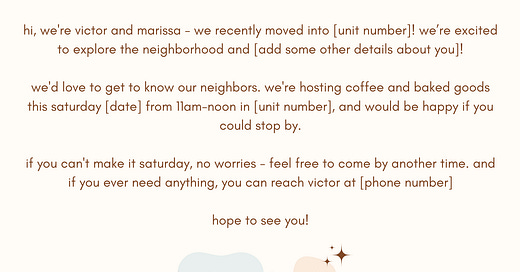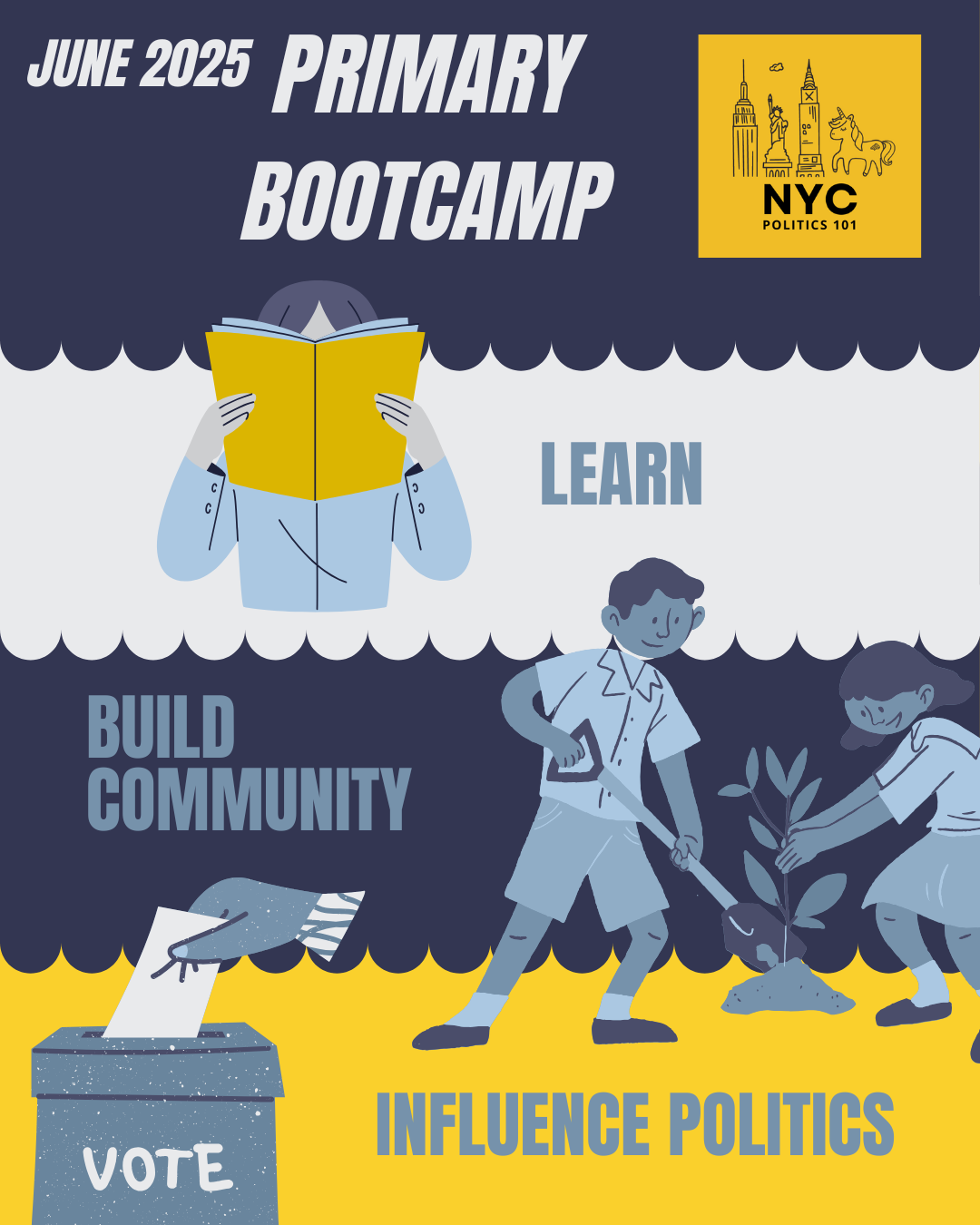Your how-to guide for getting to know your neighbors and building community that lasts
Level up your political influence by building community
Last week, I shared the opportunity to join the 2025 NYC June Primary Bootcamp. As a refresher: the goal of the Bootcamp is to level up your political influence. And have fun doing it!
Save the date for the Bootcamp Launch Party on Monday, April 14!
I’m posting examples of how other people have accomplished different Bootcamp actions. It makes it easier to do it yourself when you have a how-to guide from someone else.
It’s worth
20 points for inviting neighbors over for pastries / happy hour / informal hangout
30 points for starting a weekly potluck/picnic/basketball game that includes neighbors
This week, I have resources from community-builders Priya, Victor, and Jess to make it fun and easy for you to get those points.
Why do I care about this again? How does this help me level up my political influence?
Your political influence is based on a combination of three things: time, money, and social capital. You can’t have political influence without a solid network of people who trust you. Strong ties help you rally support for local issues and advocate for change. When you have strong ties in your community, you can mobilize people around issues that matter.
And beyond influence, a thriving community makes life richer—whether it’s someone to water your plants when you go on vacation, a friend to play board games with, or someone with a new and different perspective.
Priya’s wise words on hosting
Priya wrote a great post sharing her tips for actually hosting gatherings. Priya’s wisdom:
“Some of my friends intend to host but never do. They procrastinate on planning events because they’re worried about getting everything perfect. PSA: people want to hang out together. The logistical details matter less than you think.”
Forget Instagram. Forget Pinterest. Forget Sunset magazine. Trying to create a picture-perfect gathering will drive you so crazy you might not be able to sustain the effort.
I love Priya’s list of the things she doesn’t do. She doesn’t stress about serving food at a particular time. She doesn’t clean beforehand. She asks guests to do their own dishes. She doesn’t have enough cups:
I don’t own enough cups. At every party, some version of this conversation happens:
Friend (thirsty): Where can I find a cup?
Me (innocent): Check the cupboard.
Friend (suspicious): The cupboard’s empty.
Me (innocent): I guess we’re out of cups.
And people love her gatherings. Because it’s the connection that matters, not the details.
Keeping Priya’s tips in mind will help you build community and sustain it.
Victor’s tips for getting to know your neighbors
Victor wanted to get to know his neighbors after moving into a new building, so he took the initiative to introduce himself and build connections. He wanted to get to know his neighbors because he’s seen how proximity can lead to strong friendships. And he also knows it can be challenging to break through that initial barrier of going from being strangers to being friends.
Here's how he did it:
Introduced himself with a flyer: He wrote a brief introduction, printed it out, and shared it with neighbors on his floor, introducing himself and his wife and inviting others over for coffee and pastries (see below). He knocked on his neighbors’ doors to share the invite, but most didn’t answer, so he left the invitation under their doors too.
Made it low-pressure: He planned a coffee and pastries meetup for a weekend morning when folks were likely to be around, and kept it short so it’d be accessible to others. According to Victor, “I think if you open up a bigger window of time, then people don't know when to come. Also, people are nervous to come too early because then they're going to have to stay longer. So it just makes it really low effort if you make it a short window and you're offering something.”
Stayed persistent: Initially, he had higher expectations for turnout than how many neighbors showed up, but he didn’t get discouraged. It was great to have quality time with the handful of folks who joined for pastries, and one of them is becoming a more regular friend.
This makes sense– you’re not going to get every neighbor, or even half, to show up the first time. But that doesn't mean you're doing a bad job. Having a neighbor community is probably new to other people. Some might not be interested, and that’s okay. But some people will be excited about it and you’ll find those people that you wouldn’t have found otherwise.
Jess’s formula for starting a weekly potluck tradition
What began as a simple idea, fueled by a desire to connect friends in Boston, turned into an 11-year-long weekly potluck tradition. After a year of feeling disconnected in a new city, Jess wanted to create a community that was cohesive and fun. She began by hosting sporadic brunches and pizza nights, but nothing quite stuck until she and her roommates decided to throw a St. Patrick’s Day-themed potluck. What started as a one-off event soon became a regular fixture in their apartment, and the tradition grew from there. Their potluck has been going strong almost every week for 11 years straight. The potluck’s 10th birthday was featured on the local news. Multiple marriages have resulted from the potluck, and those who have moved away from Boston still have annual potluck reunions.

So how do you get started on your own weekly tradition?
Find your community’s thing. For Jess’s community it was a potluck. For your community, it could be a cookout or a sport or a playground meetup. Jess tried other ideas for months before she found the one that worked. She tried hosting brunches and found out that she doesn’t love getting up early on Sunday mornings and cooking for hours. She tried pizza making parties, but that didn’t stick either. According to Jess, “wait for the thing that sparks others around you and takes on a life of its own. And then relinquish control. You can still be the steward, but at that point it is shared.”
Make it a shared effort. The key to the tradition's success was making it a shared endeavor among her roommates and friends. And that happened organically in a way that the brunches and pizza parties didn’t. "People started texting us: 'What's the theme for potluck this week?'" she says. Soon, the community began to take ownership, creating new themes and inviting their own guests. A potluck is a good format for this, since every attendee expects to contribute. No one is going to text you and ask “Can you host me for dinner this weekend?” but they can text you about the next potluck since they’re volunteering to contribute.
Don’t overplan at the beginning. Jess’s suggestion for a first step is to figure out what would make the meetup a success for you– define the floor, not the ceiling. She says, “Even if no one else shows up and it was just me and my roommates, it would be fun. What would be the core group and activities that would make it worthwhile for you?” You might be tempted to start with the end in mind: “I want to create something that 30 people will come to every week”. But that’s pretty daunting. Instead, start with some early experiments that give you joy and see what grows organically from there.
The people in the room are the right people. If you’re concerned about not knowing enough people to invite, Jess understands that feeling. She said, “This is how I found the right people to invite: I made it porous.” She found that the key was simply to keep inviting people she enjoyed, knowing some wouldn’t come back, until a core community emerged. Another barrier can be when hosts hold too tightly to who should be in the room. You don’t have to over-engineer who’s there. Don’t take it personally when a specific person, or type of person, doesn’t join. At the start, Jess didn’t have a perfect group in mind– the people who stayed were the people who wanted to be there.
Though she left Boston in 2016, the potluck lives on, hosted by the original group and continuing to evolve with new members and new traditions, including an annual “potluck diaspora” reunion. "You’re putting something in motion when you create these rituals," Jess says. "It’s a living thing, and it's rewarding to see it grow."
Hosting and bringing people together takes a little bravery and a little work— that’s why these actions are worth more points. Join 2025 NYC June Primary Bootcamp to get 20-30 points for getting started building community!






